
Today we laid out an argument for why it’s vital for every man to regularly engage with hard-hitting jeremiads — a form of rhetoric that laments society’s shortcomings, predicts its downfall if those cultural blights are not addressed, and offers at least some hope that they can be and that society can emerge better and stronger than before. The jeremiad can challenge your assumptions, shake you out of apathy, spur reflection, and inspire changes in your beliefs and habits.
If that post left you looking for some incisive and thought-provoking jeremiads to grapple with, below we offer a list of 16 recommended cultural critiques. Before you dive in, here are a few important things to keep in mind about how the list was compiled:
1. Jeremiads can take many forms; they can be non-fiction or fiction, and delivered in song, poem, essay, novel, book, film, or article. This list concentrates on non-fiction books (with one essay and a bonus film thrown in for good measure).
2. Books were chosen from authors on the left and on the right, and everything in-between. While many jeremiads focus almost exclusively on politics, this list concentrates on books that have a wider focus. They sometimes incorporate politics in their theses, but do so as part of a larger cultural critique.
3. As you peruse the list, you may think to yourself, “Oh, I can already tell I won’t agree with that one.at.all.” Resist this impulse. Jeremiads are supposed to challenge your beliefs and behaviors. If one makes you angry or offended, it’s doing its job! I couldn’t believe more strongly that every man should intentionally seek out books that challenge rather than flatter his preconceived notions. So if you see a book that rubs you the wrong way, that’s a sign you should make reading it a priority!
4. I recommend also suppressing the impulse to dismiss a book because the social theory it touts has been “debunked.” The idea of social theories being debunked always makes me chuckle, because they’re not born of completely objective science in the first place; what “debunked” usually means is “not currently in vogue.” Further, even when an author’s predictions have decidedly not come to pass, their mussings can still be quite insightful and valuable to digest.
5. Jeremiads are an essential part of your “information diet,” but they need to be consumed in moderation. While their doom and gloom rhetoric serves a purpose in keeping you from getting too comfortable, they do only represent one side of the picture (the negative side). Too much pessimism and fatalism can lead to more apathy instead of less. Even scrolling through this list puts me in a funk. So mix jeremiads with texts that take a different, more positive, view.
6. This list is far from exhaustive. It is a selection of books that we have personally read and found worthwhile. “Worthwhile” does not mean “I agree with everything in every book,” but that I found them thought-provoking and they’ve stuck with me even when I’ve disagreed with some of their contentions. I intentionally kept their descriptions straightforward, so that my own biases don’t influence your reading of the texts.
Please offer your own suggestions for worthy, reflection-producing jeremiads in the comments. I look forward to hearing your suggestions and adding them to my reading list!
The Closing of the American Mind: How Higher Education Has Failed Democracy and Impoverished the Souls of Today’s Students by Allan Bloom

“Students these days are, in general, nice. I choose this word carefully. They are not particularly moral or noble. Such niceness is a facet of democratic character when times are good. Neither war nor tyranny nor want has hardened them or made demands on them…Students these days are pleasant, friendly and if not great-souled, at least not particularly mean-spirited. Their primary preoccupation is themselves, understood in the narrowest sense.”
Allan Bloom’s influential, oft-debated jeremiad takes as its focus the hollowing out of the once hallowed halls of higher education. But the book’s critiques range far wider to examine the shallowness of our culture’s intellect as a whole. Bloom argues that because the modern university has turned from the humanities, the philosophy of the ancients, and the idea of absolute Truth as the touchstone of education, students graduate without the ability to grapple with the serious questions, engage in vital self-examination, and choose the path to a meaningful life. Steeped in relativism, their only virtue is tolerance, and they see all truth claims as merely a set of different, and equally valid, “lifestyles.” Without the tools of philosophy to guide their decisions and thinking, students, and citizens as a whole, are ill-equipped to determine what “the good life” is. The solution, Bloom argues, is a return to an education rooted in the Great Books.
“Life Without Principle” by Henry David Thoreau
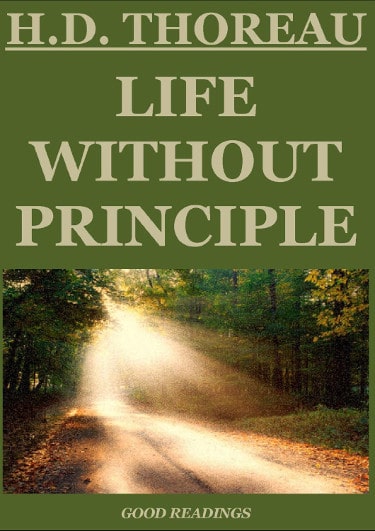
“What is called politics is comparatively something so superficial and inhuman, that practically, I have never fairly recognized that it concerns me at all. The newspapers, I perceive, devote some of their columns specially to politics or government without charge…but as I love literature and to some extent the truth also, I never read those columns at any rate. I do not wish to blunt my sense of right so much. I have not got to answer for having read a single President’s Message. A strange age of the world this, when empires, kingdoms, and republics come a-begging to a private man’s door, and utter their complaints at his elbow!…The newspapers are the ruling power. Any other government is reduced to a few marines at Fort Independence. If a man neglects to read the Daily Times, government will go down on its knees to him, for this is the only treason in these days.”
The Transcendentalists were some of America’s original cultural critics, and Henry David Thoreau penned many texts that have a jeremiad-like flavor. His “Life Without Principle” is a particularly worthwhile read. The wide-ranging essay decries the country’s narrow focus on business and making money, as well as the superficial nature of people’s conversations and their mindless devotion to equally superficial news. He argues that the news, particularly of the international variety, makes people feel like they’re engaging in something significant, when it really does not affect their lives at all. It is a distraction from higher things, so that his fellow citizens end up living in a free country, while remaining slaves to the profane and trivial.
Dumbing Us Down: The Hidden Curriculum of Compulsory Education by John Taylor Gatto
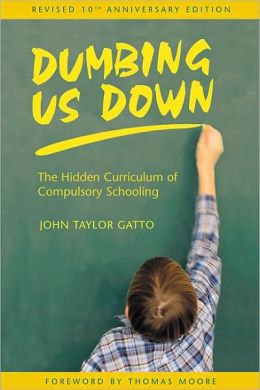
“Whatever an education is, it should make you a unique individual, not a conformist; it should furnish you with an original spirit with which to tackle the big challenges; it should allow you to find values which will be your road map through life; it should make you spiritually rich, a person who loves whatever you are doing, wherever you are, whomever you are with; it should teach you what is important: how to live and how to die.”
John Gatto was a New York City public school teacher for 30 years. He was named NYC Teacher of the Year three times as well as New York State Teacher of the Year. After receiving the latter award in 1991, Gatto resigned, and began issuing jeremiads against compulsory public education – the very field in which he excelled and made his living for most of his life.
Dumbing Us Down is a collection of essays and speeches by Gatto about the problems of public education. Gatto argues that public schools have several negative effects on children, including making them emotionally and intellectually dependent on others for motivation and affirmation. Instead of public schooling, Gatto encourages things like homeschooling and open source online education.
Empire of Illusion: The End of Literacy and the Triumph of Spectacle by Chris Hedges
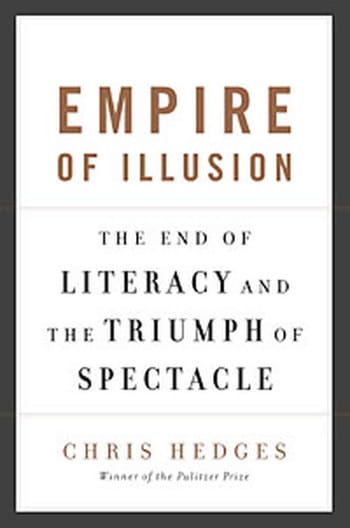
“Washington has become our Versailles. We are ruled, entertained, and informed by courtiers — and the media has evolved into a class of courtiers. The Democrats, like the Republicans, are mostly courtiers. Our pundits and experts, at least those with prominent public platforms, are courtiers. We are captivated by the hollow stagecraft of political theater as we are ruthlessly stripped of power. It is smoke and mirrors, tricks and con games, and the purpose behind it is deception.”
Chris Hedges laments the splitting of the country into two camps: those who continue to grapple with rational, literate discourse and exist in reality, and the barely literate masses who increasing retreat from reality and into a world of illusion and spectacle. Hedges decries the dumbing down of political rhetoric, the insipid popularity of celebrity culture, and the way in which the media now caters to the lowest common denominator. Corporatism creates a craven consumerism that has suffocated our morals, and made self-gratification our only shared value. Everything from college to psychology must be feel-good, entertaining, and conveyed through images as to not tax our short attention spans. Yet beneath this flashy facade of superficiality, the culture is decaying. The country, Hedges worries, is headed for destruction unless we embrace serious discourse again and address problems like the rising cost of health care, the marginalization of the working class, and pending environmental catastrophes.
The Decline of the West by Oswald Spengler
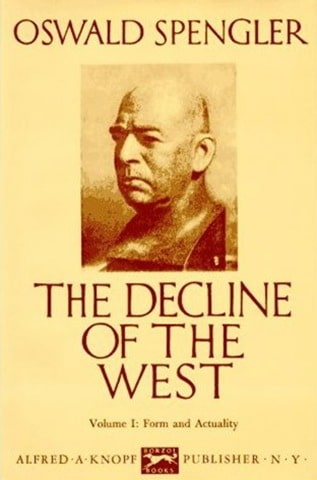
“One day the last portrait of Rembrandt and the last bar of Mozart will have ceased to be – though possibly a colored canvas and a sheet of notes will remain – because the last eye and the last ear accessible to their message will have gone.”
I have admittedly only begun reading this seminal two-volume work. Working my way very slowly through both tomes is a long-term goal of mine. The argument is surely intriguing enough: Oswald Spengler argues that cultures are essentially living organisms that pass through four seasons of development and decline, which parallel the four seasons of the year. In the early seasons, the culture is full of creative energy that leads to inward-focused growth. This spark of creativity dies out once the culture develops into a full-fledged civilization and enters the “winter” season. While we often think of civilization as a positive progression, for Spengler it is the last stage of the cultural organism’s lifespan (every culture lasts about 1,000 years) — a twilight of decay. Instead of growing, civilizations emptily expand outward. Vital life lies in the “things-becoming,” Spengler argues, not in “things-become.”
The Lonely Crowd: A Study of the Changing American Character by David Riesman
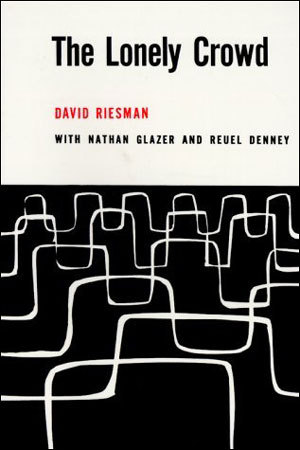
“If the other-directed people should discover how much needless work they do, discover that their own thoughts, and their own lives are quite as interesting as other people’s, that, indeed, they no more assuage their loneliness in a crowd of peers than one can assuage one’s thirst by drinking sea water, then we might expect them to become more attentive to their own feelings and aspirations.”
The Lonely Crowd is different from the traditional jeremiad — more dry and academic than angry and opinionated. But as it maps and predicts a potentially negative trend in American culture, and creates the kind of thought-provoking reflection that characterizes the jeremiad, I felt it belonged on this list. First published in 1950 as a sociological analysis of American life, the book continues to be called one of the most, if not the most, influential book of the 20th century. In the text, Riesman sets forth three types of “social character” — three mechanisms by which people conform to the society in which they live: tradition-directed, inner-directed, and other-directed. He posited that other-directed types — individuals who are sensitive to the opinions of their peers — were growing in number. But he also optimistically projected that a fourth type — the autonomous individual — could emerge in greater numbers over the decades as well.
For a full exposition of the takeaways of The Lonely Crowd, check out this post.
The Death of the West: How Dying Populations and Immigrant Invasions Imperil Our Country and Civilization by Patrick J. Buchanan
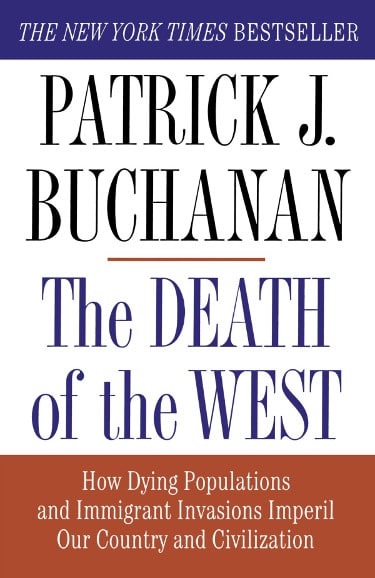
“In half a lifetime, many Americans have seen their God dethroned, their heroes defiled, their culture polluted, their values assaulted, their country invaded, and themselves demonized as extremists and bigots for holding on to beliefs Americans have held for generations.”
This would probably be a good time to remind folks that jeremiads are supposed to make you angry, and that you don’t have to agree with them in order to get something out of them. No list of jeremiads could be complete without the controversial Mr. Buchanan, as he’s essentially made them his life’s work, and he’s one of the few remaining pundits who will actually criticize both his own political party as well as his opponent’s. In this book, Buchanan argues that the Western world will reach its demise not because of military conquest or catastrophe, but because of slowly changing population demographics. Because the affluent but morally decadent upper classes are not having children, and those in developing countries are, the latter will grow and subsume the former. He contends that immigrants are not assimilating and embracing Western values as they used to, so that when the old guard dies out, the traditional culture of the West will die with them.
The Shallows: What the Internet Is Doing to Our Brains by Nicholas Carr
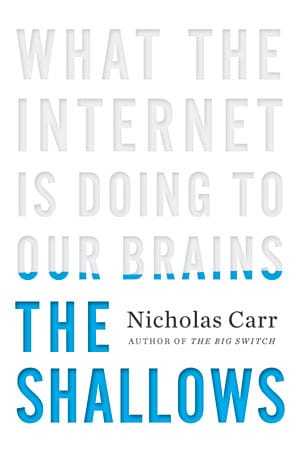
“The Net’s interactivity gives us powerful new tools for finding information, expressing ourselves, and conversing with others. It also turns us into lab rats constantly pressing levers to get tiny pellets of social or intellectual nourishment.”
A jeremiad for a uniquely modern concern: the internet and its effect on our lives. Carr explores the way our brains not only shape the mediums we apply them to, but how those mediums in turn shape our brains. Which is to say, the different kinds of ways we use our brains creates different kinds of neural pathways in them. Carr worries that while internet surfing may be a boon in numerous ways, it’s weakening our minds, so that we can deftly skim through many things, but struggle to plunge deeply into just one.
Amusing Ourselves to Death: Public Discourse in the Age of Show Business by Neil Postman
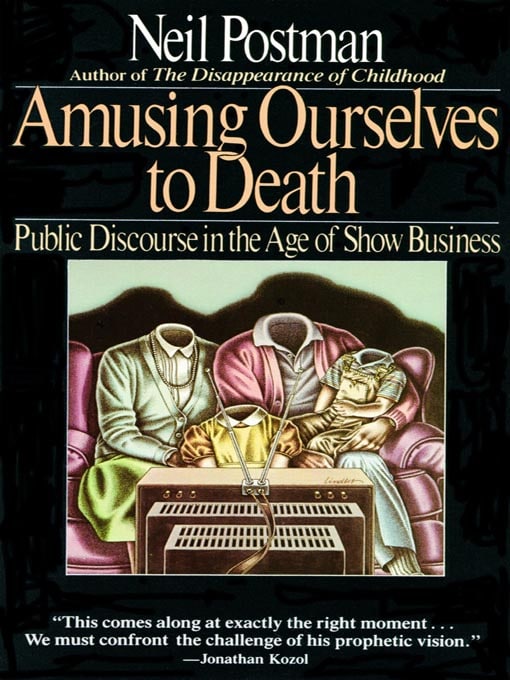
“Americans no longer talk to each other, they entertain each other. They do not exchange ideas, they exchange images. They do not argue with propositions; they argue with good looks, celebrities and commercials.”
Neil Postman spent his career critiquing our culture’s obsession with technology, mass-media, and entertainment. In his best known book, Amusing Ourselves to Death, Postman explored the impact “of the most significant American cultural fact of the second half of the twentieth century: the decline of the Age of Typography and the ascendancy of the Age of Television.” Postman argues that the medium greatly influences the message and that electronic and digital mediums are more conducive to mindless entertainment than to serious rational thinking. Because we live in an age of digital mediums, weighty topics that affect important parts of human life like politics, religion, and education are forced to be more entertaining to capture people’s attention. Hence, we are amusing ourselves to death.
Manufacturing Consent: The Political Economy of the Mass Media by Edward S. Herman and Noam Chomsky

“The question is whether privileged elite should dominate mass communication and should use this power as they tell us they must — namely to impose necessary illusions, to manipulate and deceive the stupid majority and remove them from the public arena. The question in brief, is whether democracy and freedom are values to be preserved or threats to be avoided. In this possibly terminal phase of human existence, democracy and freedom are more than values to be treasured; they may well be essential to survival.”
Noam Chomsky is one of the 20th century’s most polemic political and social critics. Whether you agree with his radical anacro-sydicalism or not, his critique of the self-censorship that happens in mass media in Manufacturing Consent should be read and considered by everyone. The main thesis of Manufacturing Consent is that because most large mass media companies are for-profit entities that rely on advertising to support the business, media firms will often self-censor themselves in order to prevent upsetting advertisers and losing money. Thus, when you watch or read the news, you might not be getting the full story. Chomsky and his co-author Edward S. Herman provide examples of when this non-coercive censorship occurred. Ever since I read Manufacturing Consent, I always read the news (from any source) with a bit of a suspicious squint.
The Culture of Narcissism: American Life in an Age of Diminishing Expectations by Christopher Lasch
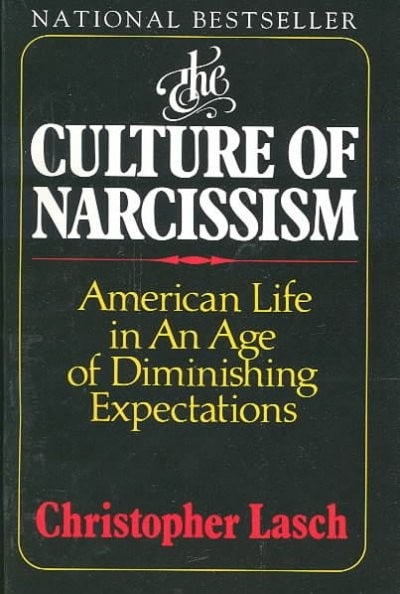
While it was written nearly 25 years ago, many would argue that Christopher Lasch’s Culture of Narcism is even more relevant today. Lasch contends that the anomie that many feel in modern society is due to the rise of a “culture of narcissism” that has been brought about not by increasing vanity and puffed up self-esteem among the populace, but rather by a diminishing of the self thanks to the growth and intrusion of anonymous networks (government, corporations, media entities) into our everyday lives. According to Lasch, because people no longer have a solid sense of self and identity, they’re constantly seeking external validation and must make themselves “seen” by others to get it. He argues that this all-consuming craving for attention has had a damaging effect on the emotional, mental, and social health of our society.
Bowling Alone: The Collapse and Revival of American Community by Robert D. Putnam

“Financial capital — the wherewithal for mass marketing — has steadily replaced social capital — that is, grassroots citizen networks — as the coin of the realm.”
Like The Lonely Crowd, Bowling Alone is more dry and academic than fiery and opinionated. But because it highlights a negative trend of declining community involvement in America, this seminal work finds a home in the jeremiad genre. Written by Harvard political scientist Robert D. Putnam, Bowling Alone uses sociological surveys and data to showcase the decline of “social capital” — civic and community engagement — in America. The title from the book stems from the fact that while the number of people bowling is at an all-time high, the number of people bowling in leagues and on teams is at its all-time lowest. A similar decline can be seen amongst traditional civic and community-focused pursuits. Instead of spending time with their neighbors, Americans are increasingly inclined towards activities that are oriented towards the individual — television, internet surfing, and consumer spending. According to Putnam, if this shift continues it will have negative effects on democracy as well as individual well-being, and he therefore argues that all citizens should strive to establish stronger community bonds.
The Death of Character: Moral Education in an Age Without Good or Evil by James Davison Hunter

“We say we want a renewal of character in our day but don’t really know what we ask for. To have a renewal of character is to have a renewal of a creedal order that constrains, limits, binds, obligates, and compels. This price is too high for us to pay. We want character but without unyielding conviction; we want strong morality but without the emotional burden of guilt or shame; we want virtue but without particular moral justifications that invariably offend; we want good without having to name evil; we want decency without the authority to insist upon it; we want more community without any limitations to personal freedom. In short we want what we cannot possibly have on the terms that we want it.”
James Davison Hunter traces the changing meaning of character, demonstrating how it went from being rooted in community-specific, externally-imposed standards, to being something each individual can define for themselves. Instead of basing the motivation to seek character on an understanding of good and evil, we offer the possibility of self-actualization; instead of speaking of “virtues,” we celebrate “values,” which are subjective and based on personal preference. He focuses on how this shift has affected “moral education” (how character is taught in schools) and covers the three main new alternatives to traditional character education: developmental psychology (you should do the right thing because it will make you feel better about yourself), neoclassicism (you should do the right thing because that’s the way it’s always been done), and communitarian (you should do the right thing so you can get along with others). Hunter argues that these new moral education programs are doomed to fail since they are not rooted in an ultimate truth and authority.
Coming Apart: The State of White America, 1960-2010 by Charles Murray
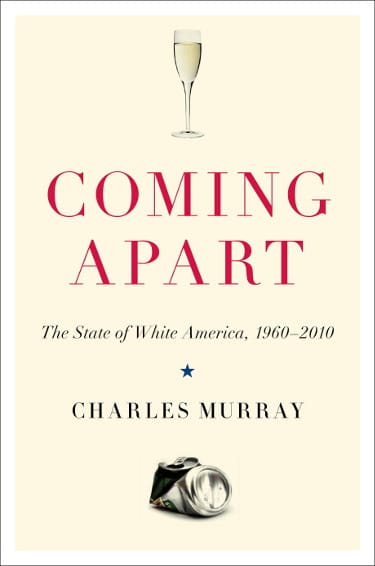
“A man who is holding down a menial job and thereby supporting a wife and children is doing something authentically important with his life. He should take deep satisfaction from that, and be praised by his community for doing so. If that same man lives under a system that says the children of the woman he sleeps with will be taken care of whether or not he contributes, then that status goes away. I am not describing a theoretical outcome, but American neighborhoods where, once working at a menial job to provide for his family made a man proud and gave him status in his community, and where now it doesn’t. Taking the trouble out of life strips people in major ways which human beings look back on their lives and say, ‘I made a difference.'”
Charles Murray centers Coming Apart on the changing culture of white America over the last decades in order to illuminate his central thesis: that there is a new class divide in America that isn’t based on race, but on behavior and values. The lower class eschews work, marriage, and higher education, would rather drink and get high than get a job, doesn’t go to church, and doesn’t care what their neighbors are doing. In contrast, those in the upper class have strong, stable families, work hard, attend religious services, and are involved in their communities. In some ways it represents an inversion of the old order of things, when the working classes were more religious and apt to marry than their upper class counterparts. Murray contends that the classes have never been so far apart in mindset and lifestyle, and can barely understand each other anymore. He argues that the values of the lower class will have deleterious effects on the entire country, and exhorts all citizens to once again embrace what he sees as our four founding values: honesty, marriage, religiosity, and industry.
No Logo by Naomi Klein

“Four years ago, when I started writing this book, my hypothesis was mostly based on a hunch. I had been doing some research on university campuses and had begun to notice that many students I was meeting were preoccupied with the inroads private corporations were making into their public schools. They were angry that ads were creeping into cafeterias, common rooms, even washrooms; that their schools were diving into exclusive distribution deals with soft-drink companies and computer manufacturers, and that academic studies were starting to look more and more like market research.”
When No Logo was published in 1999, Naomi Klein lamented the infiltration of advertisements and branding into every nook and cranny of American life. While the culture of branding has changed in the years since (people aren’t as keen to wear clothes emblazoned with large names anymore, for example), in many ways the book is more relevant than ever. Companies have found even more nooks in which to place their branding; when you’re watching a football bowl game, it’s probably the Outback Bowl featuring the yard marker sponsored by GEICO, the red zone by Old Spice, the halftime show by Pepsi, the instant replay by Cadillac, and the field goal net by Allstate. Klein not only criticizes the ubiquity of branding, but the stranglehold corporations put on the number of consumer choices, and their exploitation of workers in the name of the free market.
Spectatoritis by Jay B. Nash

“Granted freedom, many men go to sleep – physically and mentally, organically and cortically. Not having the drive for creative arts they turn to pre-digested pastimes, prepared in little packages at a dollar per. This has literally thrown us into the gladiatorial stage of Rome in which the number of participants becomes fewer and the size of the grandstands, larger. Spectatoritis has become almost synonymous with Americanism and the end is not yet. The stages will get smaller and the rows of seats will mount higher.”
Published in 1938, this hard-to-find book is one of my favorites. Nash laments the fact that while machines have opened up greater amounts of leisure time for the country’s citizenry, people are using that time for increasingly passive and mindless entertainment. He dubs this plague “spectatoritis,” and warns that it will bring about the downfall of civilization if not curbed. For, he argues, every human needs real rejuvenation from work or will succumb to a variety of mental and physical ills. Thus what we need, Nash writes, is a “philosophy of leisure” that can guide people in how to use their free time in more fulfilling ways.
Bonus Cinematic Jeremiad: Idiocracy
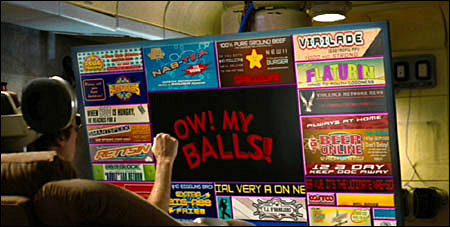
None of the books on this list are easy reads, and some are quite difficult, so when your brain gets all tuckered out from wrestling with them, take a break by watching my favorite cinematic jeremiad: Idiocracy.
Directed by Mike Judge (of Beevis and Butthead and Office Space fame), on the surface the movie is a dumb comedy full of lowbrow yuks. But it’s also a biting and hilarious satire of our culture that you’ll be thinking about long after you see it. The premise of the movie is that two people of average intelligence hibernate for 500 years and then awake to find themselves in an unbelievably stupid dystopia. Because affluent, well-educated people stopped having kids, or had only one or two, while dumb people kept on reproducing at a prodigious rate, over the centuries the mentally-stunted took over the country, turning it into an “idiocracy.” Watching it is both uncomfortable and enjoyable, and ever after you’ll be comparing the current crop of television shows to Ow! My Balls! and turning to your significant other when entering a big box store to say, “Welcome to Costco, I love you.”


